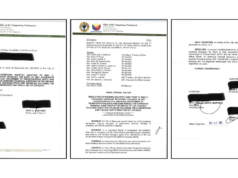CLARK FREEPORT — Farmers complain of heavy production losses while fishermen decry seriously declining harvests and they see current laws as the culprits.
Fish production has declined by 1.11 metric tons, while rice farmers have lamented a deep plunge in the farm gate prices of rice from P20.55 per kilo last year to as low as P13 this year.
The Pambansang Lakas ng Kilusang Mamamalakaya ng Pilipinas (Pamalakaya) blamed the fishermen’s sorry plight on the amended Fisheries Code under Republic Act 10654. On the other hand, the consumer group Bantay Bigas and peasant women group Amihan or National Federation of Peasant Women blamed the local rice problem on first phase of the destructive impact of the Republic Act No. 11203 or the Rice Liberalization Law.
“Municipal fisheries production in the year 2018 registered a decline of 1.78 percent or an estimated 1.11 million metric tons from the previous year’s production of 1.13 million metric tons. Municipal fisheries comprise 25.41 percent of our total fisheries production, while commercial fisheries subsector contributed 21.64 percent. The bulk of the total fisheries output in 2018 came from aquaculture with 52.95 percent,” Pamalakaya noted.
The fishers’ group noted that the decline in the municipal fisheries production “is due to the repressive provisions of the amended Fisheries Code, including the fisherfolk registration and boat licensing schemes.”
“Strict fishing regulations such as the registration and licensing schemes curtail the fishing activities of small fisherfolk, not to mention the depleting fish catch in the municipal waters due to environmental degradation caused by destructive projects and continuous intrusion of large-scale commercial fishing fleets in the 15-kilometer municipal fishing zones,” Pamalakaya chair Fernando Hicap said in a statement.
Hicap lamented that “failure to comply with these provisions will automatically deem the fisherfolk as illegal and subjected to fines with penalties such as community service, confiscation of fishing gears or fish catch, or worse, imprisonment.”
Hicap called for the scrapping of the amended Fisheries Code as he batted for “a new genuine fisheries reform law that will strengthen the local fish production and empower small-scale fisherfolk of their right to communal fishing grounds.”
Meanwhile, Bantay Bigas and Amihan, in a joint statement, noted that “the average farm gate price in April fell to P18.70 per kilo, from its P20.55 per kilo level last year.”
“Farmers from various provinces such as Nueva Ecija reported that farm gate fell to P13 to P14 per kilo, in Isabela at P16, in Laguna at P14 to P15, in South Cotabao at P14 per kilo,” the statement said.
“Government data is conservative as they only record already those being dried up at the mills or at the possession of the traders, and neglects the farmers’ stock at the barrio level,” Bantay Bigas spokesperson Cathy Estavillo said.
She slammed Agriculture Sec. Emmanuel Piňol’s “downplaying of the situation, for putting the blame on speculation and manipulation by private traders and not due to RA 11203.”
Estavillo said “the declining farm gate prices is the first phase of the destructive impact of the RA 11203, and it will be followed by the phase of displacement of rice farmers and deteriorating local rice production.”
“Subsequently, when imported rice faces no competition from the local production, this is the phase when retail price surges would surge unconstrained, as the government has already surrendered its regulatory powers in the industry,” she warned.
Estavillo stressed that “rice importation is not equivalent to cheap rice, as it is controlled by foreign monopoly and its local oligarch counterparts, whose primary interest is profit.”
She urged the stakeholders and the people to demand the scrapping of the RA 11203 Rice Liberalization Law, “as it threatens the population with foreign dependency for food, as well as with hunger, displacement and poverty.”




